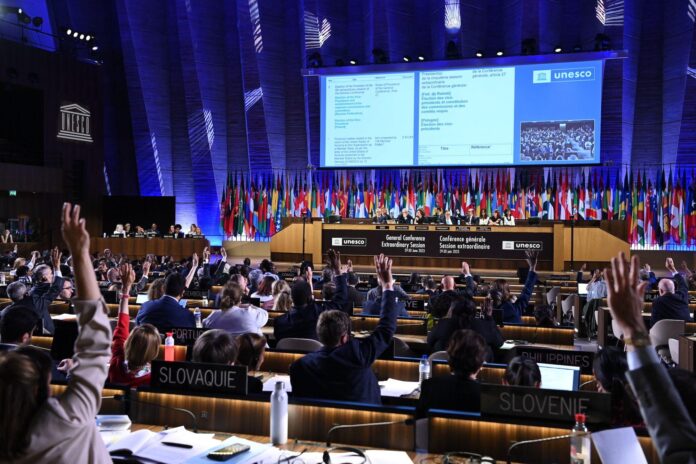The United States is set to rejoin Unesco (the United Nations Educational, Scientific and Cultural Organization) in July following a two-day special session held at the organisation’s headquarters in Paris on 29 and 30 June, which concluded Friday with a vote on whether or not to admit the country. Of Unesco’s 193 member states, 142 participated in Friday’s vote, with all but ten voting in favour.
Those that voted against readmitting the US included a number of nations with which it has had strained relations, including Russia and its close ally Belarus, Iran, North Korea and Nicaragua. China, which has stepped into the power vacuum at Unesco since the US officially left in January 2019 and become its biggest financial backer to the tune of around $65m annually, also voted against readmission.
Palestine—whose admission into Unesco in 2011 set off tensions between the US, Israel and other member states and ultimately led to former president Donald Trump’s decision to leave the organisation due to its “anti-Israeli bias” and “nonsense”—also voted against readmitting the US. (Israel also withdrew from Unesco at that time.)
As part of its readmission, the US will begin to repay around $619m in unpaid dues. It will pay 22% of Unesco’s annual budget, plus additional contributions to programmes supporting access education initiatives in Africa, Holocaust remembrance and ensuring journalists’ safety.
“Unesco’s mandate—education, science, culture, freedom of information—is absolutely central to meeting the challenges of the 21st century,” Audrey Azoulay, Unesco’s director-general, said in a speech following Friday’s vote. “It is this centrality, as well as the easing of political tensions within the organisation and the initiatives launched in recent years, that have led the United States to initiate this return.”
Legislation that Joseph Biden’s administration included in the $1.7tn federal spending bill that was passed last December specified that the US would seek to rejoin Unesco in order to “counter Chinese influence”.
Following the vote, US secretary of state Antony Blinken—whose diplomatic efforts helped set the stage for this week’s extraordinary session of Unesco’s general conference—said on Twitter, “I am encouraged and grateful that Unesco members have accepted the US proposal that will allow us to continue steps toward rejoining the organisation.”
This week’s vote in Paris sets the stage for the US to rejoin Unesco for the second time since the organisation’s founding in 1945. In 1984, during the waning years of the Cold War, Ronald Reagan’s administration pulled the US out of the agency over its alleged anti-Western bias. President George W. Bush announced the country would rejoin Unesco in 2002; the move was seen in part as an effort to shore up goodwill amid the country’s globe-spanning “war on terror”.

























